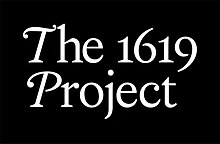 |
| In August, 1619, a ship landed in Jamestown with 20 African slaves. |
Read this. Listen to it. Absorb it into your understanding of who you are, what your nation has been, and what it is now.
The 1619 Project was created by reporters and editors at the NY Times to help Americans understand how pervasive slavery was in the birth of our nation and how much history affects our lives and institutions today.
The 1619 Project is a program organized by The New York Times with the goal of re-examining the legacy of slavery in the United States and timed for the 400th anniversary of the arrival in America of the first enslaved people from West Africa. It is an interactive project by Nikole Hannah-Jones, a reporter for the New York Times, with contributions by the paper's writers, including essays, poems, short fiction, and a photo essay.[1] Originally conceived of as a special issue for August 20, it was soon turned into a full-fledged project, including coverage in the paper and on the website.[2]
The New York Times describes the project as a "major initiative (...) observing the 400th anniversary of the beginning of American slavery".[3] The project was almost exclusively contributed to by Black academics, journalists and writers. According to Hannah-Jones, all the contributions were deeply researched, and arguments verified by a team of fact-checkers in consultation with a panel of historians.
Pt. 1 1455-1775 Slavery, Power, and the Human Cost
Pt. 2 1776-1808 The Limits of Freedom
Pt. 3 1809-1865 A Slave Nation Fights for Its Freedom
Get hold of it online, in print via The New York Times Magazine, and through podcasts.
https://www.cbsnews.com/video/the-1619-project-nikole-hannah-jones-on-confronting-the-truth-about-slavery/
https://www.realclearpolitics.com/video/2019/08/19/watch_new_york_times_presents_1619_project_memorializing_400th_anniversary_of_slavery_in_america.html
Produced with help and photos from the Smithsonian's National Museum of African American History and Culture, the 1619 Project is like taking a walk through the museum, looking at the exhibits, and reading all the posted signs while wearing an audio phone to explain them.
I want to fly to Washington, D.C., to visit the museum, but meanwhile it's all here at my fingertips-- for example, the law passed in 1662 that changed slavery from one person's status, perhaps temporary like indenture, to a condition passed from mother to child. Even if the father was a white landowner, his child was his slave and was often sold both for profit and for the convenience of not having evidence of his infidelity living with him, his white wife, and his children. See No. 1 Slavery, Power, and the Human Cost.
Here are some quotations from the 16-page insert in the Sunday, August 18, issue of the NYT.
"If one minute's freedom had been offered to me, and I had been told I must die at the end of that minute, I would have taken it." --Mum Bett, who in Boston sued for her freedom in 1882 and won it, becoming Elizabeth Freeman.
"In 1787, the Rev. Richard Allen and other black congregants walked out of services at St. George's Methodist Episcopal Church in Philadelphia to protest its segregated congregations." Initially he preached to integrated congregations, but that changed. He founded the African Methodist Episcopal Church, which has 7,000 congregations today.
"The life span of an enslaved person on a sugar plantation could be as little as seven years." Sugar cane--a deadly commodity.
"A Woman Bequeathed" --Aunt Rhody, sold in 1832 at age 1, considered part of the family, not freed until 1863.
"I shall never forget that memorable night, when in a distant city I waited and watched at a public meeting, with 3,000 others not less anxious than myself, for the word of deliverance which we have heard read today. Nor shall I ever forget the outburst of joy and thanksgiving that rent the air when the lightning brought to us the Emancipation Proclamation." -- Frederick Douglass
"Slavery gave America a fear of black people and a taste for violent punishment. Both still define our criminal-justice system." --Bryan Stevenson, "Why American Prisons Owe Their Cruelty to Slavery"
Note: Fox News, Newt Gingrich, and the Federalist Society don't like The 1619 Project. Too much truth for their taste.
No comments:
Post a Comment